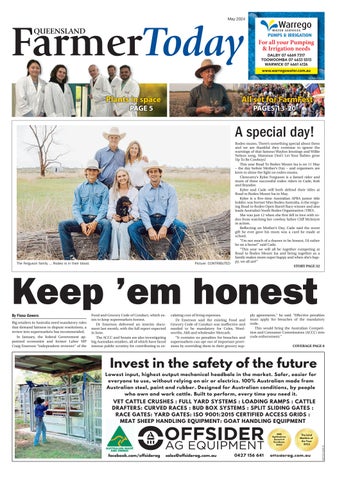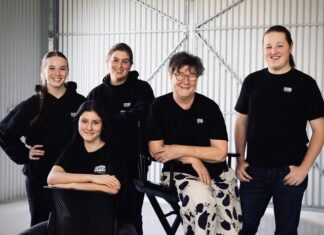Now is the time for the public to stand up and say “we give a fork” about our growers, says Queensland’s state industry body for fruit, vegetables and nuts.
The Queensland Fruit & Vegetable Growers (QFVG) association has launched a national campaign, designed as a “call to action“ for farmers and consumers to unite in drawing food from the paddock to their plate.
The We Give A Fork campaign will run through 2024. It will focus on the real stories of individual growers and encourage the public to show they appreciate and support our horticultural industry.
QFVG chief executive officer Rachel Chambers said “now is the time“ for people to demonstrate they truly care about the future of fresh fruit, vegetable and nuts being grown in Australia.
“The challenges falling on our growers’ shoulders have never felt heavier,“ she said.
“Over the past 100 years, Australian growers have faced numerous floods, droughts, cyclones, hailstorms and a pandemic.
“Yet, right now, things have never looked more challenging for their industry with the ongoing and cumulative impact of three years of rapidly rising input costs combined with what can only be described as an onslaught of poor policy making.
“Growers are at breaking point.”
With a recent AUSVEG survey finding more than 30 per cent of Australia’s vegetable growers want to leave the industry in the next 12 months, the campaign seeks to draw attention to the very real issues currently facing the entire sector.
Ms Chambers said the campaign hoped to spotlight three key takeaways.
“The first one is that input costs have risen over the past three years, between 30pc and 65pc. Nationally, the average is 37pc and productivity has decreased by up to one third. What business model can continue to sustain that?” she said.
“The second is that growers have been sustaining this business model by eating into their savings, eating into their capital and eating into their superannuation. I’ve got growers saying there is nothing left.
“And, thirdly, the policy pile-on in the past 18 months – including regulation and compliance changes in industrial relations – has dramatically changed how growers do business.
“There has been a raft of changes so rapid in succession that growers are struggling to keep up.”
Real stories from real growers released over the coming 12 months will highlight the challenges the industry faces.
“Horticulture is an immensely complex industry,“ Ms Chambers said. “We need to tell many stories so there can be understanding of its nuances. Good understanding is key to good decision making.“
QFVG is encouraging growers to come forward and share their stories to ensure the message is heard loud and clear.
Among the growers who will take part is Bundaberg producer Trevor Cross who loves what he does but is finding it increasingly difficult to make a living.
“Farming is a passion that if you didn’t love doing it, you wouldn’t do it,” he said.
“All of our input costs have gone up. A lot of stuff is 30 to 40 per cent higher. Labour is running at about 50 to 60 per cent of our income.”
Judy Shepherd, a former Queensland grower, said a key issue that needed highlighting was that growers wanted to be paid fairly for their work and what they produce but not at the expense of the consumer.
“We want to continue growing Australian food, we grow the best food in the world, the safest food in the world,” she said. “This will only happen if it’s within or in a fair and balanced market.”
Shane Fitzgerald, a Queensland-based agronomist, said while those in the industry were resourceful many were at breaking point.
“They take enormous risks all the time and they are used to that,“ he said. “But they cannot overcome this situation where they are operating in an unfair and unbalanced market. It’s incredibly frustrating. And one by one they’re gonna give up.”
For the public to be part of the conversation throughout 2024, they can participate in the #WeGiveAFork campaign across social media.
“As the peak body for fruit, vegetable and nut growers for 100 years, we are determined to ensure growers are being heard,“ Ms Chambers said.
“There must be change, our sector and the Australian public – who rely on their produce – depend on it.”
* To learn more about the campaign visit wegiveafork.com.au










